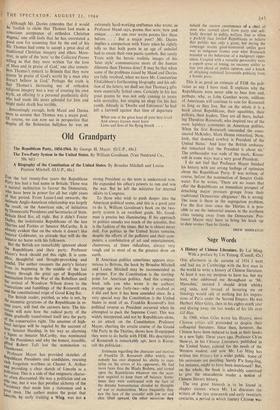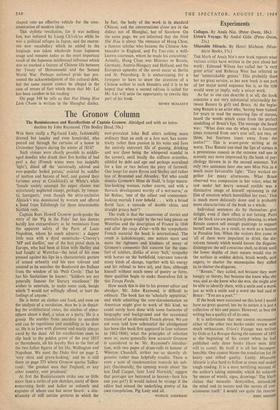Sage Words
A History of Chinese Literature. By Lai Ming.
With a preface by Lin Yutang. (Cassell, 42s.) ONE afternoon in the autumn of 1934 I went and had tea in Cambridge with the first man in the world to write a history of Chinese literature. At least it was my purpose to have tea, but my host, who addressed me. throughout as `Mr. Mussolini,' insisted I should drink whisky anq soda, and instead of lecturing me on Sinology would talk of nothing but his impres- sions of Paris tinder the Second Empire. He was Herbert Allen Giles, then in his eighty-ninth year and dozing away the last weeks of his life over Gil Bias.
In 1900, when Giles wrote his History, most Chinese critics still pretended to despise their colloquial literature. Since then, however, the Chinese have been induced to look at their books in a new light. Three years ago, Professor Ch'en Shou-yi, in his Chinese Literature, published in the United States, catered for the needs of the Western student, and now Mr. Lai Ming has written this History for a wider public. Some of his omissions are puzzling. Surely P'u Sung-ling, for instance, ought to have been mentioned? But, on the whole, the book is admirably contrived to give the unacademic reader a notion of Chinese literary history.
The one great blemish is to be found in chapter sixteen, where Mr. Lai discusses the writers of the late nineteenth and early twentieth centuries, a period in which literary Chinese was shaped into an effective vehicle for the com- munication of modern ideas.
This stylistic revolution, for it was nothing less, was initiated by Liang Ch'i-ch'ao while he was a political refugee in Japan, and the enorm- ous new vocabulary which he added to the language was taken wholesale from Japanese usage and remains today as the most important result of the Japanese intellectual influence which was so marked a feature of Chinese life between the Treaty of Shimonoseki and the Second World War. Perhaps national pride has pre- vented the acknowledgment of this cultural debt, but the same excuse cannot be alleged in the case of errors of fact which show that Mr. Lai has been careless in his reading.
On page 348 he tells us that Hai Shang Hua Lich Chuan is written in the Shanghai dialect.
In fact, the body of the work is in standard Chinese, and the conversations alone are in the dialect not of Shanghai, but of Soochow. On the same page, we are informed that the Nieh Hai Hua is about 'the romance of Hung Chun, a famous scholar who became the Chinese Am- bassador to England, and Fu Tsai-yun, a well- known courtesan, whom he made his concubine.' Actually, Hung Chun was Minister to Russia, Germany, Austria-Hungary and Holland, and the European episodes of the novel occur at Berlin and St. Petersburg. It is embarrassing for a foreigner to have to draw the attention of a Chinese author to such blunders and it is to be hoped that when a second edition is called for Mr. Lai will seize the opportunity to rewrite this part of his book.
HENRY MCALEAVY



































 Previous page
Previous page